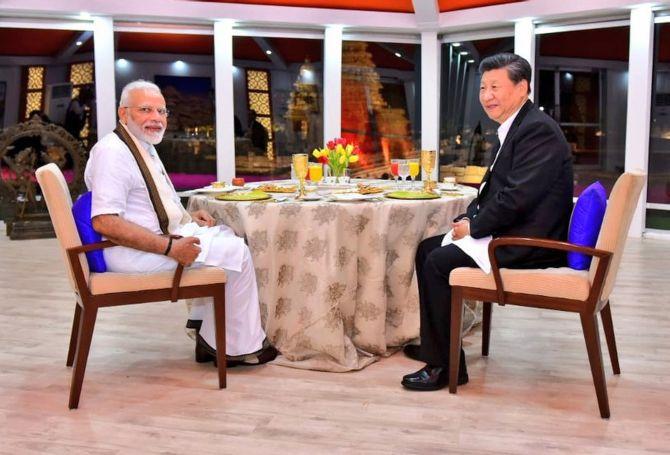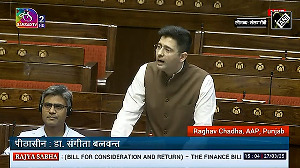'The MEA, hopefully, made it clear that the Indian PM can't be seen in Xi Jinping's company when China has, for all intents and purposes, annexed over 1,000 sq kms of Indian territory in eastern Ladakh, and essentially that the Wuhan spirit and the Mamallapuram spirit have turned into vinegar.'

Dr Bharat Karnad is emeritus professor in National Security Studies at the Centre for Policy Research and author of Staggering Forward: Narendra Modi and India's Global Ambition, which analyses Prime Minister Modi's military policies from 2014.
"Modi is convinced the army is incapable of recovering the lost territory. The flipside of this view is that diplomacy is the only alternative -- something slyly pushed by Jaishankar and the MEA," Dr Karnad tells Rediff.com Senior Contributor Rashme Sehgal.
It seems brazen of Chinese Foreign Minister Wang Yi to breeze into India after China occupied over 1,000 sq km of Indian territory in Ladakh in 2020.
Just prior to his entry to New Delhi, he did not hesitate to criticise India on Kashmir at the OIC meet.
Should he have been allowed to come to India?
Visits by foreign ministers are usually scripted affairs. There are no surprises and Wang Yi's trip stuck to this norm.
However, what was unexpected was that (External Affairs Minister Subrahmanyam) Jaishankar and the MEA did not have a hefty public riposte ready once Wang sang his aria on India's mistreatment of Kashmiri Muslims in J&K at the OIC meet in Islamabad.
The MEA should have highlighted China's ongoing programme of genocide against Uyghur Muslims in Xinjiang and Wang's hypocrisy and chutzpah in talking of Indian Kashmiris.
It would have rhetorically levelled the field for the diplomatic discussions Wang had with Jaishankar and National Security Adviser Ajit Doval.
If India and China joined hands and spoke in one voice, Wang Yi said the world would listen to us.
Was Wang Yi taking taking Indian support for granted?
Perhaps. More likely he was here, in the main, to plead for Modi's presence at the 2022 BRICS summit that Beijing is set to host.
Modi and the MEA, hopefully, made it clear that the Indian PM can't be seen in Xi Jinping's company when China has, for all intents and purposes, annexed over 1,000 sq kms of Indian territory in eastern Ladakh, and essentially that the Wuhan spirit and the Mamallapuram spirit have turned into vinegar.
Why should India and China be on the same page when we have fundamental differences on several issues, the most problematic remaining our border issue?
Propagandists in China are telling India to 'forgive and forget'. Whatever do they mean by that?
India's formally repeated stance that normalcy in relations are predicated only on the restoration of the status quo ante implies that New Delhi will choose to 'forgive and forget' once China returns all Indian territory and especially restores India's frontage on the strategic Xinjiang Highway and the Karakoram Pass that is now lost owing to the PLA's occupation of the Y-Junction in the Depsang Plains.
Instead of seizing this opportunity to have put pressure on China to reverse the land grab as also to show we mean business by stopping the import of several Chinese consumer goods, we have done nothing of the kind.
Why is that when dealing with such a belligerent neighbour, India continues to use a soft approach?
The reason apparently is that Prime Minister Modi is convinced the Indian Army is incapable of recovering the lost territory.
The flipside of this view is that diplomacy is the only alternative, something slyly pushed by Jaishankar and the MEA.
Some observers believe that Xi Jinping is isolated and therefore this reaching out. Is this perception correct?
It is hard to read the politics within the Chinese Communist party councils and the corridors of power in Zhongnanhai (where the Chinese Communist leadership lives and works).
But there's ample evidence to suggest that many powerful sections (in the Chinese Communist party) are upset for different reasons.
The PLA that Xi has assiduously courted, for instance, feels alienated because military solutions to forcibly reunify Taiwan, Aksai Chin and the Sennkaku Island chain have been held in abeyance.
Both India and China have not condemned the Russian attack on Ukraine, but India's reasons for not doing so are different from that of China.
Can you explain to our readers why our support is based on a different paradigm from that of China and will this support in the long run adversely impact our relationship with the US and Europe?
India's neutrality on Ukraine is motivated principally by three factors.
One, the reality of the Indian military's dependence on Russian hardware and spares and servicing support.
Two, the fact that Russia has been more forthcoming in assisting in high-technology projects (nuclear-powered submarines, for instance) and frontline weapons systems than the US and the West.
And three, the geopolitics of maintaining India's profitable status as an 'indispensable State' to both Russia and US and the West.

Did Wang Yi come to India in the hope of creating a wedge between India and the US?
Wang couldn't drive a wedge if he tried. India and the US are mindful of why they need each other -- to deal with the menace of China!
Should Prime Minister Modi attend the BRICS and RIC summit?
Yes. Because the economic and trade thrust of BRICS in particular aside, it affords India the opportunity, I have argued in my last (2018) book -- Staggering Forward: Narendra Modi and India's Global Ambition to use the sidelines to sound out Brazil, Russia and South Africa with the aim of forming a loose and informal security coalition BRIS.
BRIS together with the modified Quadrilateral or 'Mod Quad' of India-Japan-Australia -- a group of Southeast Asian nations or Quadrilateral minus the US -- I have argued, would be able to ring fence China better than any other security arrangement.
The Mod Quad because the US has once again proved in Ukraine -- its willingness to fight to the last Ukrainian -- just how unreliable and untrustworthy it is as an ally and strategic partner.
India is playing host to several foreign dignitaries including the Russian foreign minister, the UK foreign secretary, the Mexican foreign minister... What is this indicative of?
Maybe because more countries are beginning to appreciate how important India is to the global correlation of forces and for a stable international system.
Feature Presentation: Aslam Hunani/Rediff.com











 © 2025
© 2025